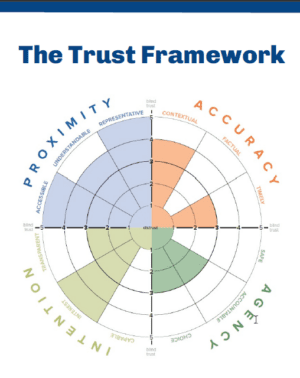Trust has become more and more the focus of a lot of research, including in media and in the humanitarian sector. Like a holy grail, agencies and journalists chase it, bank on it, cherish or assume it. However, “it” is hard to define, hard to plan for and even harder to measure. Yet, everyone seems to agree it’s important if not crucial to make sure information is not ignored and services are not rejected.
This analytical framework was created on the back of almost 10 years of Internews work on misinformation in humanitarian crisis and wanting to go beyond the binary idea of trust being either “there” or not.
The Rooted in Trust project, provided an opportunity to dig a bit deeper and contrast and compare dynamics in communities across more than 10 countries and contexts. The project was designed to provide locally relevant and reliable information as an alternative for misinformation circulating during the COVID-19 pandemic. It built local networks of community-based organisations, local media, humanitarian agencies, and experts to collect community concerns, questions, and criticism, identify and increase access to preferred communication channels and create locally relevant and reliable information in return.
This set-up allowed us to develop a new framework, within the community, together with local experts, that would not just allow us to measure which information providers are trusted, but also help to understand why or why it is not the case. It also generated insights on what could be done to improve trust and as such, make information and services more likely to be used and acted upon. With Focus Group Discussions, Key informant Interviews, data analysis of the ongoing “rumour tracking” activities within the project, a few themes emerged from these exercises that seemed to be recurrent and relevant, regardless of context we were working in, or the topics that were discussed.
The Trust Framework that is developed can be used in different ways: first, it provides a more nuanced language that can help inform the conversation and further research around trust, beyond the binary approach of “it” being there or not. Second, it can help as an analytical framework to understand better the data coming out of the numerous audience/user/client surveys and assessments that are implemented to get smarter about the communities, contexts or countries organizations are working in. Lastly, it hopefully helps not just to “understand”, but also to improve the way projects are designed, content is created, impact is assessed, evaluating the dynamic relationship between organizations and the reasons why people like, share or reject their information.
Linked to the framework is a toolkit with questionnaires, designed to help with the analysis, design, monitoring or evaluation of information-related work. If you would like to know more about it, please contact Internews.
Check out an animated overview of Internews’ Trust Analytical Framework:
Click here to view the video in Arabic, French, or Spanish.
